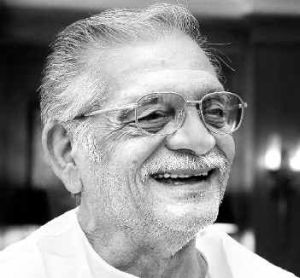“Isn’t it enough to see that a garden is beautiful without having to believe that there are fairies at the bottom of it too?” – Douglas Adams
The lyricist of a Bollywood song has one of the toughest (and most thankless) jobs on earth. A good lyricist struggles – that is the only word to describe their way of working. On the lyricist’s shoulder falls the unenviable job of lending credibility to the unbelievable spectacle of people breaking into song in the midst of their humdrum boring existences. The tough job of placing personalities and circumstances in context with time and place. In many ways their process is possibly more taxing than that of the music director, their riyaaz just as rigorous as that of the singer. A badly written line sticks out like a sore thumb, a well written line slips in unnoticed and may or may not get the applause it deserves. All guts, a fraction of the glory. And then there is The System, with a long and lurid history of treating their lyricists like dirt. There are plenty of horror stories about readymade tunes being force-fed to the poor unwitting lyricist and he then sitting and indulging in verbal calisthenics of the ‘sona-khona-rona’ and ‘saans-aans-romaaance’ variety because the rhyme is the reason in the end.
In Chennai just a couple of days ago, we answered a quiz question on the iconoclastic Sahir. So incensed was he by the fact that the lyricist took a back seat to the music director and everybody else in the Hindi film song, that he made two demands. 1) He pegged his salary at a rupee above what the lead singers got and 2) made sure that lyricists were credited on radio as well.
And where Sahir (to borrow a cricketing parallel) was like Mark Greatbach at the ’92 World Cup; swinging and scything away at everything in sight- redefining the role of the lyricist, Gulzar pulled a Sachin. Stepped quietly into the role a few years later and stamped his authority all over it for the next few decades until, when history judges them, there will be only one name that stands tall over every other.
There are very few Greatest of All Time Debates that are non-controversial, but as far as lyricists go, this one I think is fairly straightforward – Gulzar first, everyone else a distant second. Before we go any further ahead though, I’d like to issue a small disclaimer – all I am trying to do is list the many things to admire about his writing through his biggest body of work. Posterity is largely a function of the lens you choose to look at it through – and this post doesn’t mean to ignore his numerous achievements in non-film and film writing, direction, poetry and even mentoring people. It’s just me saying thank you on his 81st birthday, in possibly the only way I know how.
Over a couple of Old Monks and cigarettes a long time ago in a hostel, two Gulzar fanboys tried to conduct an analysis of what it was that they really liked about him (with a few others in attendance). What I’m going to do is essentially sum up that discussion. Among the many drunk philosophical gems that emerged that night, one was that Gulzar’s skill as a lyricist is essentially like water. It takes the form of whatever surrounding it’s put in. And that underlies two classic Gulzar trademarks- versatility blended with a prolificacy that makes your jaw drop.
There is the popular belief among critics, social commentators and historians alike that the role of cinema in general, and Bollywood in particular, is to provide a reflection of its times. For more than five decades now, Gulzar’s songs have unfailingly held up that mirror. Black and white screen era innocence- Mora Gora Ang Lai Le from Bandini with the staid SD supervising. The angst and desperation that messed with my parents’ generation of the 70s – Koi Hota from Mere Apne. The birth of parallel 80s cinema and society in flux – any of the gems he pulled off with RD. The 90s that saw India open up to the rest of the world – a theme song for a Japanese cartoon dubbed for DD which included the previously unheard-of word ‘chaddi’ in a song. Come the 2000s and a bolder, more assertive liberated India – Kajra Re and Namak Ishq Ka. And as recently as a few months ago – songs from Dedh Ishqiya that saw him jam with Honey Singh and Mika, perhaps representing a generation that itself is a hodge-podge of multiple weird and non-syncretic cultures. The sheer beauty of the Gulzar catalogue is that you can repeat this exercise along multiple dimensions – geography, language, genre, music director, singer, gender and situation- and you would end up with pretty much the same results. A song for every mood, every place and every time.
His other big strength is that over the years, the sheer quantity of his work has inevitably been backed up by almost impeccable quality. He is what T. S. Eliot described as Il Miglior Fabro– the better craftsman. For starters, he has tirelessly soldiered on as the sole torch-bearer of Urdu for decades now. While his contemporaries, peers and youngsters have abandoned the language in favor of simpler everyday speak, Gulzar carries on unhindered, unfazed and perhaps just a bit nostalgic for a time that was. While I can’t speak for everyone, for me personally, many a Gulzar song served as my first introduction to what is a beautiful language. The way I see it, the odd Urdu word that leaps up from a Gulzar song is perhaps a reminder that we’ve left something behind and that someday we might want to consider turning back for it.
Then there is his unquestioned mastery of the metaphor – Gulzar does blatant better than many others but Gulzar also does subtle like no other. A few years ago if someone had said that the aforementioned ‘chaddi’ would be part of a song that almost everyone was singing, I’d have booked them a one way ticket to the asylum. But ‘chaddi pehen ke phool khila hain’ in many ways was the anthem of my generation. And while ‘Os mein gholi, mint ki goli’ from that random song in Jhoom Barabar Jhoom or “Gilehri ke joothe matar” from the Kaminey soundtrack may not have come off quite as spectacularly as “Sapne mein milti hain” or “Chaiyya Chaiyya” – the fact remains that there were Easter eggs scattered throughout and it was up to you to find them. What lyricist worked a reference to Ghalib into an item number set in a shady bar in UP in the early 2000s or rewrote Amir Khusrau to coincide with desert film set in the 80s- the answer is always Gulzar.
To place the free meandering speech of Mera Kuch Samaan and the joy of Huzoor Is Kadar Bhi Na Itra Ke Chaliye back to back on a playlist is to experience a combination of your breath being taken away and receiving a moderately gentle punch to the gut simultaneously. You know both are Gulzar songs when you hear them. Even with the softest song, you know Gulzar wrote it, because his trademark is on it like some Orwellian boot to the face. The end result is often bewildering, sometimes overwhelming and at times downright silly but ensures that you will not sit still. You will fidget, possibly to try and figure out the meaning of the odd word or in sheer frustration that you can’t make head or toe of it or sometimes just on account of its sheer raw power in reaching out to grab you – by the throat, by the hip or even by the balls (depending on context). Or as one of the not so passionate people in that hostel room summed up: “Aadhe se zyada time samajh mein nahi aata kya likha hai b********, but accha lagta hain”.
Above everything else, I must confess that more than anything else, Gulzar’s work is its own joy. You could revel in it, learn from it, elaborate the ‘tough’ Urdu parts for a stranger, quote them to your better half (Tere Bina Zindagi Se), sing along with a friend because they transported you back to the 80s (Huzoor Is Kadar), dance to them like nobody is watching (Beedi, Namak etc) or even sit with a glass in hand staring at the sky and hum them to yourself all the time wondering where this is headed (the entire Kishore –RD canon of the 80s).
Lines of Nastaliq scribbled across a sheet in a measured practiced hand that I can’t read but know intimately. To be read, quoted, admired, twisted to make quiz questions, and more than anything else enjoyed and shared. A song for everyone. A song for every place. Most of all, songs to listen to, not just to hear.
Thank you and have a happy 81st Gulzar sahab.
Disclaimer: The playlist below isn’t meant to be the best of Gulzar. Just some of my favorites and therefore runs the risk of being RD and Vishal Bhardwaj heavy though I’ve tried not to make it so. If I made the list tomorrow, more than half of them would probably be replaced by something else I like, so take it with a pinch of salt. Better still, make your own.
(Our newest guest writer works as a consultant when he is not winning some quiz or cracking terrible jokes on twitter or looking up avatars of Hulk to use as display picture)
- Wo sham kuch ajeeb thi – Khamoshi (Music: Hemant Kumar, sung by Kishore Kumar) aka number 1 Ganges song (yes, over Chingaari koi Bhadke)
- Koi chupke se aake – Anubhav (Music: Kanu Roy, Sung by Geeta Dutt) aka Pure black and white magic
- Haal chaal theek thaak hain- Mere Apne (Music: Salil Choudhary, Sung by Kishore Kumar & Mukesh) aka Social Commentary done right
- Tere bina zindagi se koi- Aandhi (Music: R D Burman, Sung by Lata Mangeshkar & Kishore Kumar) aka the one song that always makes me cry a little
- Dhanno ki aankho mein – Kitaab (Music: R D Burman, Sung by R.D Burman) aka The definitive train song
- Ek Akela is sheher mein – Gharaonda (Music: Jaidev, Sung by Bhupender) aka the Bombay song
- Aye zindagi gale laga le – Sadma (Music: Ilaiyaraja, Sung by Suresh Wadkar) aka not the Yesudas song
- Khamosh Sa Afsana – Libaas (Music: R D Burman, Sung by Lata Mangeshkar) k.a the other one yaar, the one that is not from Ijaazat
- Top top topi topi – Alice in Wonderland and Chipkali ke nana hain – Danasur (Music: Vishal B, Sung by a bunch of kids) aka the other TV cartoon songs
- Chod Aaye Hum Wo Galiyan – Maachis (Music: Vishal Bharadwaj, Sung by Hariharan, KK, Suresh Wadkar and Vinod Sehgal) aka politically loaded song with Om Puri cameo
- Aye Ajnabee- Dil Se (Music: A.R. Rahman, Sung by Udit Narayan) aka the train song that stays on the platform
- Yaaro – Hu Tu Tu (Music: Vishal B, Sung by Hariharan & Lata Mangeshkar) aka the one with Shetty Anna trying to look serious
- Asmaa ke paar shayad – Rockford (Music: Shankar-Ehsaan-Loy, Sung by Shankar Mahadevan) aka post 2000 school farewell song
- Banda ye bindaas hain – Aks (Music: Anu Malik, Sung by KK) aka the one that preceded a whole bunch of naughty songs like Beedi, Namak etc
- Saathiya (title track) – (Music: A R Rahman, Sung by Sonu Nigam, Dominique and Clinton Cerejo and Benny Dayal) aka Urdu master class
- O saathi Re-Omkara (Music: Vishal B, Sung by Suresh Wadkar & Shreya Ghoshal) aka song that has Gulzar written all over it
- Yeh ashtray nahi bharti – No Smoking (Music: Vishal B, Originally sung by Veva Sengupta) aka goosebump inducing version narrated by Gulzar sahab himself
- Yaaram – Ek Thi Daayan (Music: Vishal B, Sung by Sunidhi Chauhan & Clinton Cerejo) aka the glamorous ghost song




